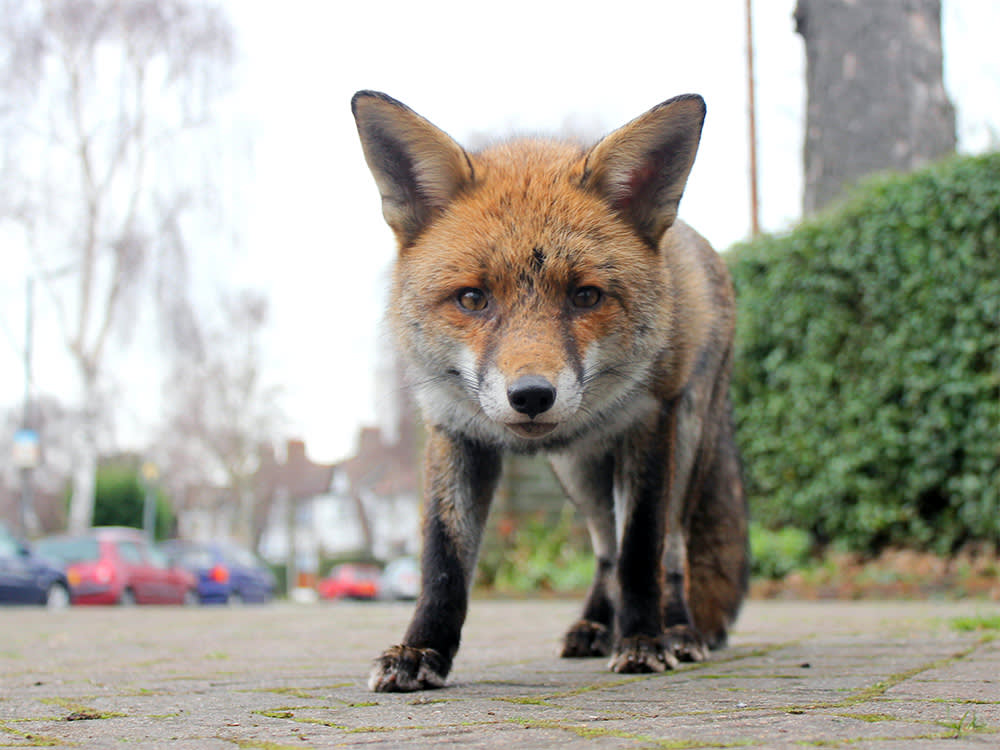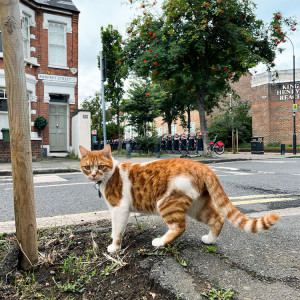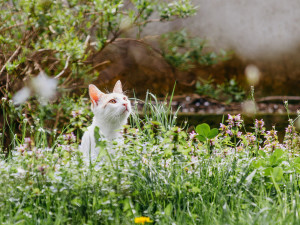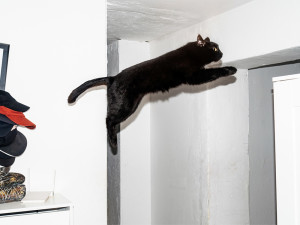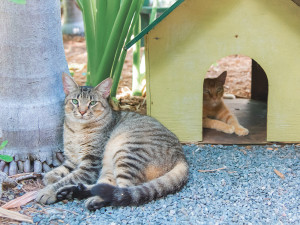Cats and Foxes: Friend or Foe?
A veterinary nurse and cat behaviourist explains the relationship between foxes and cats
Urban foxes have been around in the UK for nearly 100 years – or to be more precise, they were always here and our cities sprung up around them in what was once the countryside. There are reports of the occasional foxopens in new tab on Hampstead Heath dating back to 1912, although they weren’t seen with any regularity in the city until the 1930s. Foxes are very adaptable and many urban and suburban habitats provide ideal conditions for them, and they have no real reason to leave (some tracking dataopens in new tab suggests foxes born in urban areas may prefer towns to rural landscapes) – plus, the fact we indirectly provide them with an abundance of food to scavenge makes living alongside us a no-brainer.
With foxes now ubiquitous on our streets, many cat parents whose cats free-roam outside might wonder whether they pose any danger to their feline friends. Here’s the lowdown on whether cats and foxes are friends or foes.
Are foxes dangerous to cats?
Fear not, as the good news is that foxes and cats are able to share territories without any major issues, especially if there is ample food on offer. An adult cat’s core territory is the area in which they will actively defend their resources, so if your cat is out patrolling its territory, it is more likely to chase the fox away rather than the other way round. But generally, as a cat moves through its territory its awareness of scentopens in new tab and their interpretations will lead their way to a safer route.
Cats Protectionopens in new tab explains: “In rare cases where a fox has been found to have eaten a cat, it’s usually the case that the cat was already dead when the fox found them, as foxes are scavengers more than hunters.” How rare actually are these cases? Stephen Harris, a retired professor of environmental sciences at the University of Bristol toldopens in new tab British Wildlife in 2020 that “as a very rough estimate, I calculated that only around one in 500 road-killed cats is scavenged by a fox. It is common to see a fox sniff a dead cat and pass on. Cats are not a favoured food item and, presumably, eaten only if a fox is particularly hungry.”
But usually they co-exist peacefully, even if they do happen to have the occasional encounter. Learning through observation and trial and error, your cat is most likely to just give the fox a wide berth.
Are foxes dangerous to kittens?
Kittens and foxes do not mix! As kittens learn about their world and its dangers, it’s important for cat parents to supervise kittens when they’re outside. Foxes hunt small animals such as rats and rabbits, and so while adult cats would be too big a challenge, kittens could be a tempting option. As foxes are nocturnal and mainly hunt at night, the easiest way to avoid this is to ensure your kittens remain indoors at night-time, and to keep an eye on them during the day if they have access to your garden.
Do foxes ever attack cats?
The vocal range of foxes can be quite alarming – if you’ve ever been woken up by their screeching during breeding season (January to February) you’ll know what I’m talking about. During this time, foxes do become more territorial, which can lead to fox-on-fox fights. Elderly and sick or injured cats are also more at risk of being attacked by foxes during this time. However, the risk is very low: VetCompassopens in new tab, a collaborative not-for-profit research project run by the Royal Veterinary College (RVC)opens in new tab in London, which gathers information about health issues affecting pets in the UK, identifiedopens in new tab 79 (5 in 10,000 cats) confirmed and 130 (9 in 10,000 cats) suspected fox fights with cats from 145,808 VetCompass cats over a period of three years. So to put fox attacks into context, attacks by other cats are 40 times more likely, and road traffic accidents are 14 times more likely to present dangers to cats than foxes.
Do cats ever attack foxes?
As cats are known for their territorial behaviours, it is not unusual for bold and confident cats to chase foxes away – and they’re not shy about using their claws when the need arises.
Do they compete for the same prey?
A cat’s culinary preferences when it comes to hunting are usually small rodents and birds, although larger breeds and prolific hunters such as Bengals may be tempted by wild rabbits and even squirrels. Foxes catch rabbits, rodents, birds, frogs and earthworms as well as eating carcasses of animals that are already dead. But they are actually omnivores and will dine on berries and fruit, too. Urban foxes will also scavenge for food in dustbins and often catch pigeons and rats. However, as our cats don’t hunt for survival, and there is usually plenty of prey and scavengable food to go around, foxes and cats rarely clash over resources.
Can cats catch diseases from foxes?
The UK is still a rabies-free country and so there is no risk of your precious feline catching rabies from a fox, but they can transmitopens in new tab fleas, ticks and other parasites. So make sure your cat is always up to date with their flea and tick treatments if they’re sharing territory with foxes.
Should I let my cat outside if I know there are foxes around?
If you’re still not sure about letting your cat share their space with foxes, then keeping them inside during the times that foxes are more likely to patrol is the easiest solution, ie dusk, overnight and dawn. If you or your neighbours house small pets or chickens, then you may find that foxes are more likely to visit your garden, so ensure all small animals are securely housed (for their safety more than anything else!).
Discourage foxes from visiting your garden by not leaving out any potential food sources and making sure bins are securely closed and not overflowing with tempting morsels. You can also create a ‘fox proof’ space using high fences and prickly hedges as deterrents. Never underestimate a foxes agility and persistence, where there is a will, there is a way! But remember, the chances of your cat getting hurt by a fox are very low – so let them roam free if they’re so inclined.
